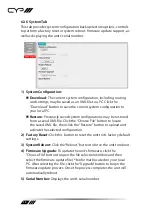
11
2) Output EDID:
Download:
To save the EDID from the connected display to your
local PC, select the sink from the dropdown list then press the
“Download” button. Depending on your browser settings you will
either be asked where to save the downloaded file, or the file will
be transferred directly to the default download location on your PC.
3) Input EDID:
This section provides controls for assigning a new EDID
to one, or all inputs within the system.
Appoint/All:
Selecting “All” will allow the assignment of a single
EDID to all inputs simultaneously. Selecting “Appoint” allows for a
different EDID to be assigned to each HDMI input.
EDID Selection:
Click on the input button on the left to open the
EDID Table List window. Select the new EDID source to use and the
change will occur immediately across all selected inputs.
Note: In most cases, assigning a new EDID to an input will cause the
affected inputs to briefly blink out while the source adapts to the new
information.
This unit provides the following 6 default EDIDs:
Unit’s default EDIDs
FHD 2CH
1920×1080p@60Hz (4.95Gbps), 8-bit colour,
LPCM 2.0
FHD MCH
1920×1080p@60Hz (4.95Gbps), 8-bit colour,
LPCM 7.1 & Bitstream
UHD 2CH
3840×2160p@30Hz (10.2Gbps), 12-bit Deep
Colour, LPCM 2.0
UHD MCH
3840×2160p@30Hz (10.2Gbps), 12-bit Deep
Colour, LPCM 7.1 & Bitstream
UHD+ 2CH
3840×2160p@60Hz (18Gbps), 12-bit Deep
Colour, LPCM 2.0
UHD+ MCH
3840×2160p@60Hz (18Gbps), 12-bit Deep
Colour, LPCM 7.1 & Bitstream
Note: In some rare cases it is possible for custom or external EDIDs to
cause compatibility issues with certain sources. If this happens, it is
recommended to switch to one of the 6 default EDIDs for maximum
compatibility.






























